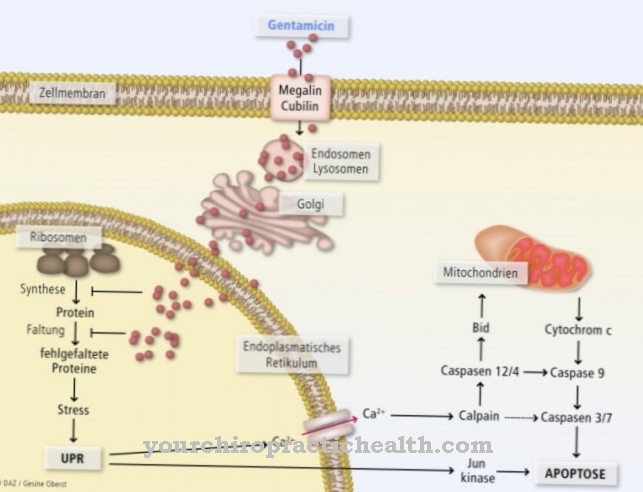Glycopyrronium bromide is a drug belonging to the group of parasympatholytics. It is used as an active ingredient to reduce secretion in the chronic obstructive pulmonary disease COPD. As an anticholinergic, it suppresses the effects of acetylcholine in the parasympathetic nervous system.
What is glycopyrronium bromide?

Glycopyrronium bromide is a chemically complex active ingredient with a quaternary ammonium structure. As an inner salt, it consists of an organic cation and the anion bromide.
It is also chemically related to atropine. As a pure substance, it is a white, crystalline powder. Due to its salt structure, it is light in water and in fats b. z. w. Oils insoluble. Glycopyrronium bromide has a bronchodilator effect and is therefore used to treat COPD. It works very quickly, but also long-term, so it only has to be used once a day. The treatment is carried out as a powder inhalation.
Due to its low solubility in fat, it can hardly cross the blood-brain barrier and therefore does not cause any serious psychological side effects when used. Only side effects occur which are related to reduced secretion in the mucous membranes and sweat glands.
Pharmacological effect
Glycopyrronium bromide unfolds its influence on the muscarinic receptors of the parasympathetic nervous system. It inhibits the effect of acetylcholine and thus indirectly suppresses the nerve conduction in the parasympathetic nervous system (parasympathetic nervous system).
In addition to the sympathetic and enteric nervous system (intestinal nervous system), the parasympathetic nervous system belongs to the so-called vegetative nervous system. The parasympathetic and sympathetic nerves act as opponents. The parasympathetic is responsible for the internal functions of the body during rest, while the sympathetic promotes external activities.With increased activity of the parasympathetic nervous system, there is a greater secretion of mucus in the bronchi and sweat from the sweat glands.
There is also an increased motility of the gastrointestinal tract. The inhibition of acetylcholine on the muscarinic receptors of the parasympathetic nervous system naturally also reduces secretion production, sweat formation and gastrointestinal activity. In addition, the heart rate is lowered. Such reductions in certain body functions are necessary for the symptomatic treatment of some diseases or in preparation for operations.
Medical application & use
Glycopyrronium bromide is mainly used in the symptomatic treatment of COPD, the chronic obstructive pulmonary disease. Here, the secretion of mucus is to be reduced by expanding the bronchi. The drug is inhaled daily as a powder. A cure for the disease is not possible, but combating the symptoms significantly increases the quality of life of the patient.
The drug is also used in the extremely severe disease of rattle breathing. Here the patient is no longer able to cough up the secretion that has formed and threatens to suffocate. The same applies to swallowing disorders with increased salivation. Glycopyrronium bromide is also used before operations to reduce saliva and mucus secretion.
Since the muscarinic receptors respond well to glycopyrronium bromide, z. B. the effect of reducing the flow of saliva at a dosage where side effects do not yet play a role. Another area of application of glycopyrronium bromide is induction of anesthesia in order to reduce secretion and heart rate here too. The drugs are also effective in treating gastrointestinal disorders.
In this way, the increased intestinal activity is reduced and the gastric juice secretion is reduced. Hyperhidrosis should also be mentioned as a further indication. Hyperhidrosis is a disease in which excessive perspiration occurs.
Risks & side effects
As with all drugs, this also occurs when using Glycopyrronium bromide Side effects. Side effects may include dry mouth, constipation, headaches, sleep disorders, urinary tract infections and also visual disturbances.
It should be said that these side effects are usually relatively mild. Use is contraindicated only in the case of specific hypersensitivity to glycopyrronium bromide. In addition, glycopyrronium bromide must not be used in combination with other parasympatholytic agents. Serious side effects of glycopyrronium bromide can be prevented because the positive effects occur even at low doses and the effect lasts for a relatively long time.
Furthermore, glycopyrronium bromide is insoluble in fat due to its ionic structure and therefore cannot cross the blood-brain barrier. As a result, the active ingredient cannot trigger any serious central nervous disorders such as memory disorders, confusion or hallucinations.



























